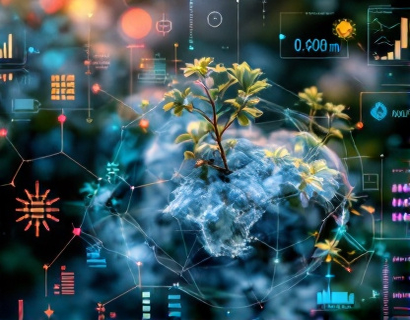Autonomous AI Agents: Maximizing Business and Personal Productivity with Continuous Objective Management
In the rapidly evolving landscape of technology, Autonomous AI Agents stand out as a transformative force, redefining how businesses and individuals manage tasks and achieve goals. These intelligent systems operate independently, continuously managing a wide array of tasks and objectives, thereby allowing users to focus on high-value activities that drive growth and innovation. This article delves into the intricacies of how Autonomous AI Agents can streamline operations, enhance efficiency, and provide actionable strategies for maximizing productivity in today's fast-paced environment.
The Core Concept of Autonomous AI Agents
At their core, Autonomous AI Agents are sophisticated software systems designed to perform tasks with minimal human intervention. These agents are equipped with advanced algorithms and machine learning capabilities that enable them to learn from data, adapt to new inputs, and execute tasks efficiently. The key feature of these agents is their ability to manage continuous objectives, ensuring that tasks are completed not just once, but repeatedly and consistently over time.
Continuous objective management is the cornerstone of Autonomous AI Agents. Unlike traditional task management systems that require constant oversight and manual adjustments, these AI agents can dynamically adjust their priorities and strategies based on real-time data and changing conditions. This adaptability is crucial in a business environment where priorities can shift rapidly and unexpected challenges often arise.
Benefits of Autonomous AI Agents in Business
For businesses, the integration of Autonomous AI Agents can lead to significant improvements in productivity and operational efficiency. One of the most notable benefits is the reduction in manual workload. By automating routine and repetitive tasks, employees are freed up to focus on more strategic and creative work. This shift not only enhances job satisfaction but also fosters innovation and growth.
Another critical advantage is the enhancement of decision-making processes. Autonomous AI Agents can process vast amounts of data quickly and accurately, providing insights that humans might overlook. These insights can inform better strategic decisions, optimize resource allocation, and improve overall business performance. For instance, an AI agent can monitor sales data in real-time, identify trends, and adjust marketing strategies accordingly, leading to higher conversion rates and increased revenue.
Personal Productivity Boost
Beyond the corporate realm, Autonomous AI Agents can significantly boost personal productivity. Individuals can leverage these agents to manage their daily tasks, schedule appointments, and even handle complex projects. By offloading mundane tasks to AI, individuals can reclaim valuable time and mental energy, allowing them to focus on personal development, hobbies, and family.
For example, an AI agent can manage a personal calendar, ensuring that appointments are scheduled optimally and reminders are sent out automatically. It can also track fitness goals, monitor nutrition plans, and provide personalized recommendations based on user data. This level of support can lead to a more balanced and fulfilling personal life.
Implementing Autonomous AI Agents: Practical Strategies
To fully harness the potential of Autonomous AI Agents, businesses and individuals need to adopt practical strategies for implementation and integration. Here are some actionable steps to get started:
- Identify Core Tasks: Begin by identifying the tasks that are repetitive, time-consuming, or prone to human error. These are ideal candidates for automation by AI agents.
- Choose the Right Technology: Select AI solutions that align with your specific needs. Consider factors such as scalability, customization options, and integration capabilities with existing systems.
- Set Clear Objectives: Define clear and measurable objectives for the AI agents. This will help in setting up the right parameters and ensuring that the agents work towards achieving specific goals.
- Monitor and Adjust: Continuously monitor the performance of AI agents and make adjustments as needed. This includes refining algorithms, updating data sources, and fine-tuning task priorities.
- Train and Educate: Provide training for employees or family members on how to effectively use and interact with AI agents. Understanding the capabilities and limitations of these systems is crucial for maximizing their benefits.
Case Studies and Real-World Applications
To better understand the practical applications of Autonomous AI Agents, let's explore a few real-world examples:
In the manufacturing sector, a company implemented AI agents to manage supply chain logistics. These agents monitored inventory levels, predicted demand, and automatically placed orders with suppliers. As a result, the company reduced inventory costs by 20% and improved delivery times by 15%.
In the healthcare industry, AI agents are used to manage patient schedules and follow-up appointments. By automating these tasks, medical professionals can focus more on patient care, leading to better health outcomes and higher patient satisfaction.
For small business owners, AI agents can handle customer service inquiries through chatbots. These agents can provide instant responses to common questions, freeing up human customer support teams to handle more complex issues. This not only improves customer satisfaction but also reduces operational costs.
Challenges and Considerations
While the benefits of Autonomous AI Agents are substantial, there are several challenges and considerations that need to be addressed:
First, there is the issue of data privacy and security. AI agents require access to sensitive data to function effectively, which raises concerns about data breaches and unauthorized access. Implementing robust security measures and adhering to data protection regulations is essential.
Second, there is the risk of over-reliance on AI. While AI agents can handle many tasks, they are not infallible. It is important to maintain human oversight and ensure that critical decisions are not solely based on AI recommendations.
Third, the initial setup and integration of AI agents can be complex and resource-intensive. Businesses should plan accordingly and consider seeking expertise from AI consultants to ensure a smooth transition.
Future Trends in Autonomous AI Agents
The field of Autonomous AI Agents is rapidly evolving, with several exciting trends on the horizon:
First, the integration of AI with other emerging technologies such as the Internet of Things (IoT) and 5G networks will enhance the capabilities of AI agents. IoT devices can provide real-time data, while 5G can enable faster and more reliable communication, allowing AI agents to respond more quickly and accurately.
Second, advancements in natural language processing (NLP) will make AI agents more conversational and user-friendly. This will improve the user experience and make AI agents more accessible to a broader audience.
Third, the development of more sophisticated machine learning models will enable AI agents to handle more complex tasks and make more nuanced decisions. This will expand their applicability across various industries and use cases.
Conclusion
Autonomous AI Agents represent a significant leap forward in productivity and efficiency, offering businesses and individuals the tools to manage tasks more effectively and focus on core activities. By continuously managing objectives and adapting to changing conditions, these agents can drive substantial improvements in performance and outcomes. As the technology continues to advance, the potential for AI agents to transform various aspects of life and work is immense. Embracing this technology with a strategic approach can lead to a more productive, efficient, and successful future.











































